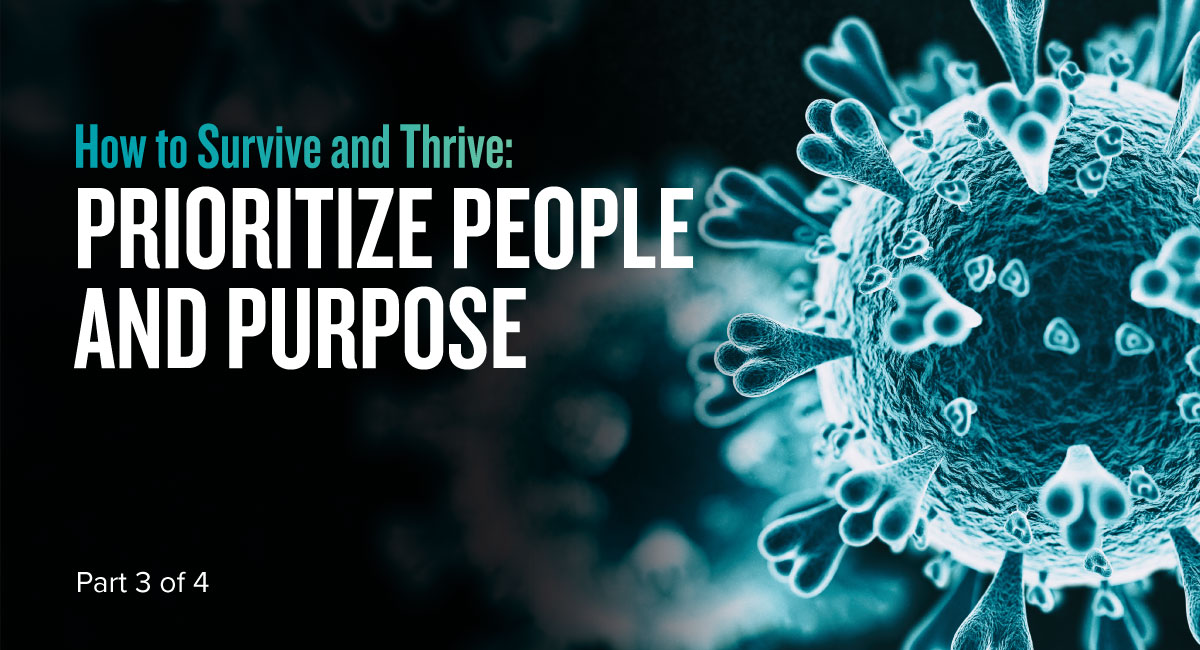This is the third of a four-part series describing these steps:
- Embrace humility.
- Overcome fear with action.
- Prioritize people and purpose.
- Combine offense with defense.
Free White Paper and Webinar
Download the “Coronavirus: How to Survive and Thrive” White Paper and view the webinar recording.
Download White Paper Watch Recording
Prioritize People and Purpose
The most important thing successful leaders do in times of crisis is put their employees and purpose at the center of everything they do. Applying that filter to decision making, no matter what uncertainties you face, allows you to preserve your organization’s heart and soul – the lifeblood of any enterprise.
This is particularly true during this crisis, which increasingly looks like it will be a marathon, not a sprint, characterized by exhaustion and uncertainty. Keeping employees engaged is critical to survive and thrive, but not easy. It will require a focused effort to communicate with employees and rally them around shared values.
How brands step up to this crisis – or not – will long be remembered. Countless companies are now working to manufacture masks, gowns, ventilators, hand sanitizer and other critical supplies; provide food, lodging or transportation to health care workers, first responders and the needy; or donate cash or other financial relief to small businesses.
Consumers are paying close to attention to these efforts. Most of all, however, they are watching how employees are treated. This may, in fact, be an important and lasting shift in corporate responsibility.
Companies that successfully engage employees in this way prosper, improve customer service and retain talent, research shows. A Gallup study found that corporations with the most engaged employees generate four times as much earnings per share growth than their competitors. The study found that those companies outperform laggards on the S&P 500 by nearly 80%.
Every company should have a clearly defined purpose, best defined by the EY Beacon Institute as “an aspirational reason for being that’s grounded in humanity and inspires a call to action.” Developing a purpose platform – and a robust program to achieve it – takes time, effort and investment. But that investment generates a significant return in both good and challenging times. Millennial workers, who now compose half the U.S. workforce, particularly are interested in working for organizations with a clearly articulated purpose that extends beyond making money or delivering shareholder value. A study by PwC found that millennials are 5.3 times more likely to stay when they have a strong connection to their employers’ purpose.
There also is strong evidence that purpose drives growth, something all businesses will look for when this crisis passes. A study by the EY Beacon Institute and Harvard Business Review found that 85% of companies with a clearly articulated and understood purpose show growth while 42% of companies that have not prioritized purpose lost revenue. Despite such evidence, only 46% of 474 corporate executives surveyed for the global study said purpose informs their company’s strategic and operational decision making.
Some Examples of Prioritizing People and Purpose:

Unilever, the world’s largest soap company and consumer goods giant, is putting its purpose to work to meet the needs of consumers, communities, customers, suppliers and employees. The company is providing more than $108 million of soap, sanitizer, bleach and food to consumers and communities. To protect jobs and support its customers and supply chain, Unilever is providing more than $540 million in financial relief to the most vulnerable small and medium-size partners. Workers threatened with a loss in income due to market disruptions or the inability to work – including contractors – will receive up to three months in pay.
The auto companies that powered the Arsenal of Democracy during World War II and built iron lungs for polio patients are stepping up to build ventilators, respirators, face shields and masks to help meet the growing needs of patients and health care workers on the front line. GM is partnering with Ventec to make respirators at an Indiana car plant idled by the virus. Ford Motor Company is partnering with 3M, GE Healthcare and the UAW on the initiative, demonstrating the company’s purpose of bringing people together in tangible ways.
We’re proud to work with @3M, @GEHealthcare and @UAW to lend our engineering and manufacturing expertise to quickly expand production of urgently needed medical equipment and supplies for healthcare workers, first responders and patients fighting #COVID19. pic.twitter.com/fzMMDjgVmS
— Ford Motor Company (@Ford) March 24, 2020
